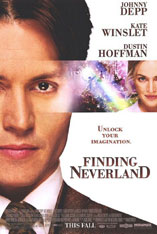EFL Movie Study Guide for:
Finding Neverland
Story: Set in London (1904),
the story was inspired by Scottish author James Barrie’s creative journey
to write the classic play Peter Pan. Tired of the same old themes, Barrie
(Johnny Depp) gets inspiration from a relationship with four fatherless
boys and their beautiful, recently widowed mother (Kate Winslet). The
result is a touching tale that mixes imagination, everyday life, personal
tragedy, genuine friendship, the childlike innocence of “the boy who never grows up,” and
the miracles that can happen if you “really believe.” (2004; 1 Oscar; J
Depp, K Winslet, Dustin Hoffman; Miramax Films; drama and a bit of history;
PG; 100 minutes)
People and proper nouns:
Mr Charles Frohman – an American producer who pays for Mr. Barrie’s plays
(he profits if they are successful, but loses money if they aren’t
successful)
James (JM) Barrie – Scottish playwright (in a manner of speaking, in order
to stay creative he has become like a “boy who never grows up”)
Mrs Barrie – James’ wife, a former actress
Porthos – the Barries’ big dog
Mr & Mrs Snow - faithful theater patrons and fans
Authur - a cricket teammate and close friend
Sylvia Llewelyn Davies – recently widowed (her husband died of cancer),
and mother of George, Jack, Peter & Michael
Madam du Maurier - Sylvia’s mother, who doesn’t really like James (if
Sylvia is frequently seen with a married man, other men will not want to
marry Sylvia)
A few terms
(vocabulary):
 |
Opening night – the first night a play or movie is shown to the public
|
 |
dungeon – another word for a jail, prison
|
 |
imagination – the creative part of your mind, and the ability to use that
part to create stories, see fantastic places, pretend to be someone else,
etc.
|
 |
critics – people who write newspaper articles about new plays, movies,
etc., either praising them or saying that they are not worth seeing
|
 |
fairy – a small imaginary person with magic power and the ability to fly
|
 |
crocodile – a large reptile with strong jaws
|
 |
Peter Pan – Mr. Barrie says this character in his play represents “the
irrepressible spirit of youth”
|
 |
rumors – things people say based on what someone else said, not
necessarily based on the truth
|
 |
pirate – a feared sailor whose group steals from other ships on the ocean
|
 |
orphans – children without parents
|
 |
genius – a person with exceptional talent or abilities; also used to
describe remarkable things such a person creates: “He is a genius. His
work is (a stroke of) genius.”
|
 |
1. Unfavorable evaluation of a play: “It’s absolute rubbish.” Newspaper
headline: “Play fails to impress”
|
 |
2. Explanation for why a play
failed: “The critics made it important. After all, what’s it called?
Play.” (At this time, theater was generally considered a serious event, so
it was hard to understand Mr. Barrie’s humor and imagination.)
|
 |
3. “I was hopelessly naïve when I
married you.” That is, my view of things was too simple and childlike. I
should have had a more “grown up” attitude.
|
 |
4. “I don’t want you inquiring into
it any further.” That is, this is not your concern; it is “none of your
business.”
|
 |
5. “I wouldn’t dream of it.”
Absolutely; I completely agree with you that I should not do something.
|
 |
6. “I don’t want a flea’s bit of
doubt.” That is, use your imagination; don’t have any doubt that your
little brother can get this kite to fly.
|
 |
7. “Write about anything. Write
about the talking whale that’s trapped in your imagination and desperate
to get out.” That is, use your imagination.
|
Discussion
1. Why is it important for a
child to learn to use his/her imagination?
2. Tell us about something you
imagined, such as a friend to play with or a place you once dreamed about.
3. How old should you be when
you stop using your imagination?
4. If entertainment (at least
in part) is supposed to broaden our view of the world, where can
entertainers look to find the inspiration they need?
5. Several times, Mr. Barrie
said that the key to unlocking creativity was “to believe.” How do people
know what to believe in?
6. Many of history’s greatest
people believed in a dream or a goal that the people around them couldn’t
see or imagine. Examples include Sun Zhong Shan’s vision of a new China,
Martin Luther King Jr’s dream of “colorblind” racial harmony, and the
Wright Brothers’ belief that people can fly. Where do we get the strength
to believe like they did, when the people around us think we are crazy?
7. Mr. Barrie said Peter Pan
could fly because he believed “long enough and hard enough.” When is
“having a lot of faith” not enough? What is more important than how
strongly you believe?
8. What is your dream, or have
you gotten too old to use your imagination?

